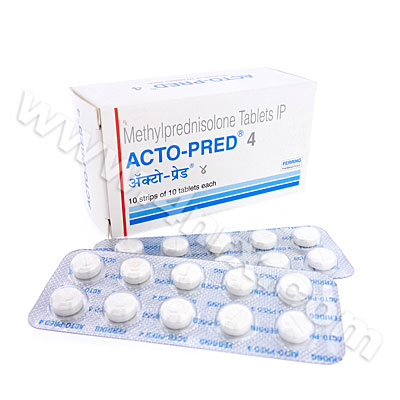 |
Home  Allergies Allergies  Acto-Pred (Methylprednisolone) Acto-Pred (Methylprednisolone) |
|
|||||||||
|
Acto-Pred (Methylprednisolone)
What is Acto-Pred (Methylprednisolone) used for? Acto-Pred (Methylprednisolone) is a type of medication known as a corticosteroid which is used to treat inflammation caused by a variety of conditions. This drug is effective in treating arthritis, skin conditions, breathing disorders, lupus, psoriasis, allergic disorders, ulcerative colitis, as well as other conditions. How should I use Acto-Pred (Methylprednisolone)? Patients should consult their physician before taking Acto-Pred (Methylprednisolone) so that the correct dosage can be prescribed to them. The dosage may vary considerably, depending on the condition being treated. Patients may be prescribed as little as 4mg daily, for minor conditions, whereas patients with more severe symptoms may be directed to take up to 48mg per day. Conditions such as multiple sclerosis and cerebral oedema may require an even higher dosage. Patients should attend all scheduled visits to their physician while taking this medication. You should never abruptly stop taking this medication, as your physician may need to gradually reduce your dosage. What are the side effects of Acto-Pred (Methylprednisolone)? Some side effects which may occur while taking Acto-Pred (Methylprednisolone) include:
Consult your physician immediately if any of these side effects persist or worsen, or if you notice changes in vision, depression, seizures, coughing up blood, breathlessness, pancreatitis, signs of low potassium such as extreme thirst and increased urination, or signs of high blood pressure, such as uneven heartbeats or seizures. Please Note Strictly follow all instructions provided to you by your physician or pharmacist while using Acto-Pred (Methylprednisolone. Optimum and safe dosage can differ based on the patient and the condition being treated. As this medication may be unsafe for certain patients, it is essential you always inform your physician if you are pregnant or breastfeeding, as well as if you have any allergies, other illnesses, or ongoing health conditions, especially cirrhosis, heart problems, depression, thyroid problems or seizures, and if you are taking any other form of medication, supplements, or herbal products. Patients should carry an ID card with them which states that they are currently using corticosteroid medication. This medication should not be taken if you have an untreated fungal infection. Immediately seek emergency medical care if you have any allergic or hypersensitive reaction. Common signs of a reaction include hives, swelling, skin rashes, chest pains, as well as trouble breathing or swallowing. 

|
|||||||||||||||||